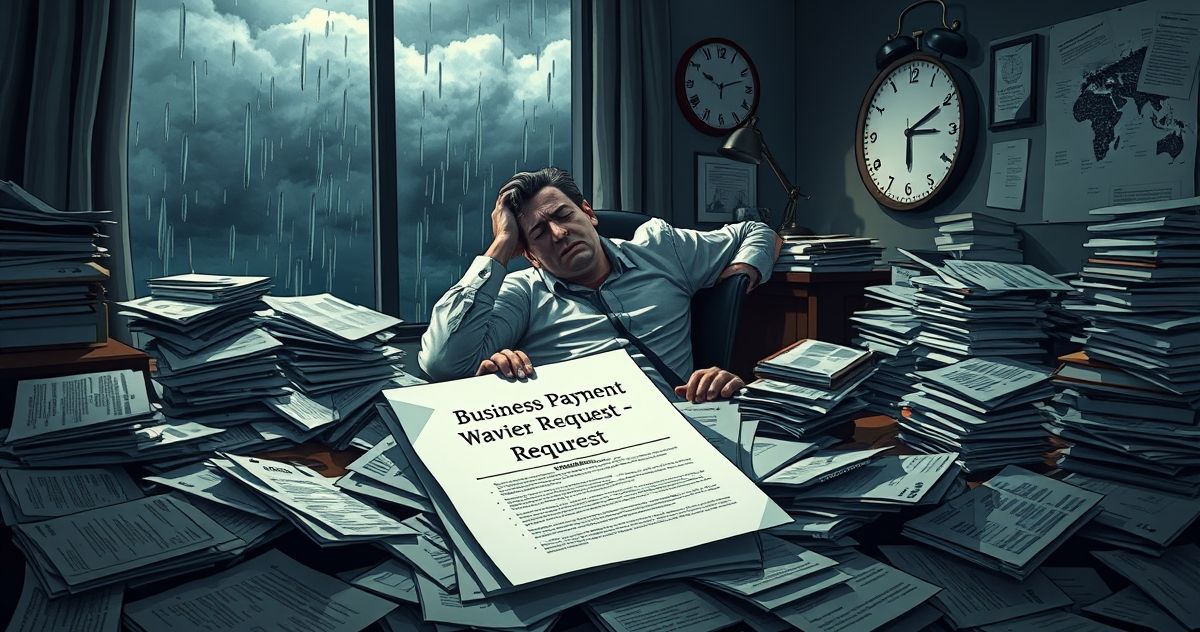Understanding Business Payment Waiver Requests
A Business Payment Waiver Request is a formal petition submitted by businesses to waive or reduce penalties and interest associated with late tax payments or underpayment attributed to unforeseen financial or operational circumstances. This tool is pivotal for businesses striving to preserve their financial integrity during adverse situations beyond their control, such as natural disasters, economic downturns, or unexpected cash-flow challenges.
Primary Purpose
The primary objective of a Business Payment Waiver Request is to offer relief from the financial burden of penalties when a business is unable to fulfill tax obligations on time due to genuine, unforeseen setbacks. By mitigating the penalties, businesses can focus on stabilizing their operations without the fear of escalating debts triggered by accrued penalties.
Key Features or Components
- Eligibility Criteria: Businesses must demonstrate reasonable cause or circumstances justifying the delay or shortfall in tax payment. Acceptable reasons include natural disasters, severe economic impacts, system malfunctions, or any unforeseen events that significantly disrupt regular business operations.
- Documentation and Evidence: Providing thorough documentation is crucial. This includes financial statements, third-party verification, insurance claims, or any relevant correspondence that supports the waiver request.
- Filing Process: Requests are usually accompanied by a formal statement explaining the nature of the hardship experienced, alongside the documentation that substantiates the claim.
- Response Time: The processing time for such requests can vary, with typical timeframes ranging from a few weeks to several months depending on the jurisdiction and complexity of the request.
Relevant Filing or Compliance Requirements
To initiate a Business Payment Waiver Request, businesses must typically file specific forms as outlined by their local tax authority. These forms collect information about the nature of the penalty, the period it covers, and the underlying reasons for the waiver application. It’s pertinent for businesses to remain up-to-date with tax filings and ensure that all prior obligations are accurate, even if payment on those obligations is delayed. This ensures the request is viewed favorably and processed efficiently.
Penalties or Consequences for Non-Compliance
Failure to address required tax payments, especially without filing a waiver request or without approval, can lead to significant financial repercussions including substantial fines, compounding interest on due amounts, and, in severe cases, legal actions or asset seizures. Moreover, withholding or falsifying information during the waiver request process can lead to legal penalties and damage to the business’s credibility and rapport with tax authorities.
Importance in Tax Resolution and Financial Compliance
Business Payment Waiver Requests hold tremendous significance in enhancing a business’s capability to regain financial footing after encountering pressing circumstances. By easing the burden of penalties, they provide businesses with the opportunity to channel resources towards stabilization and recovery. Additionally, they represent an essential compliance tool, reinforcing the idea that businesses remain accountable yet can seek to rectify their position in good faith. Beyond immediate relief, successful waiver requests can influence future interactions with tax authorities by illustrating a business’s commitment to transparency and proactive management of financial obligations.
In conclusion, comprehensively understanding the procedure, benefits, and implications of Business Payment Waiver Requests is vital. It enables businesses to efficiently maneuver through adversities without accruing the additional financial strain of penalties. Businesses are encouraged to thoughtfully prepare their requests, maintaining clear, honest communication with tax authorities to ensure the smoothest path towards resolution and compliance.

